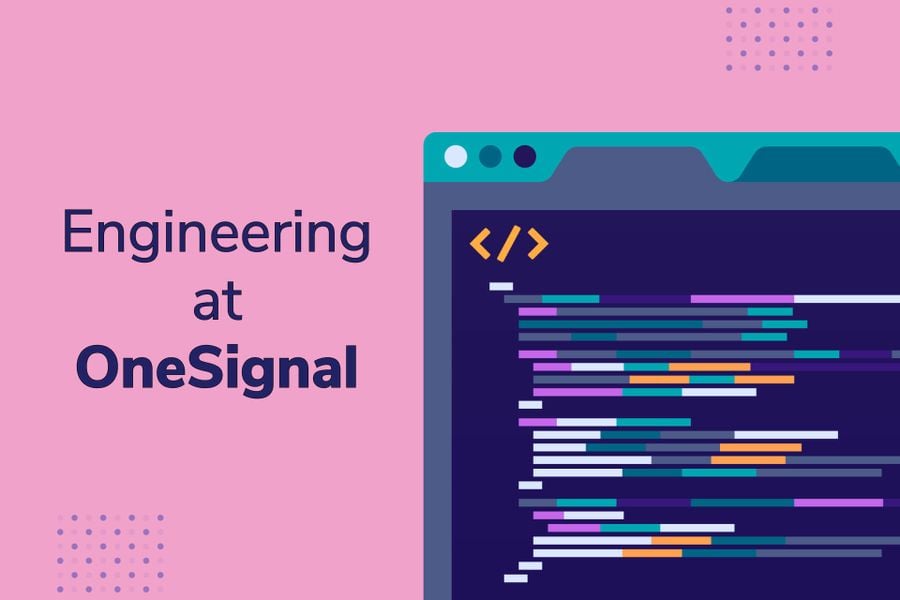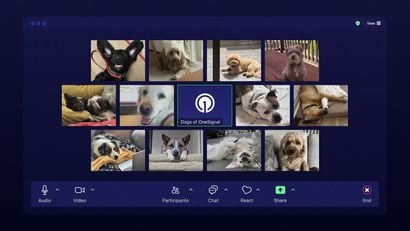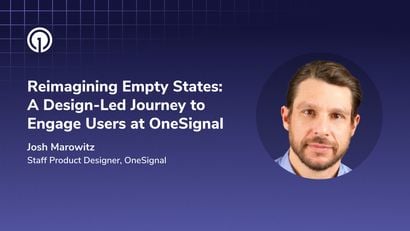The challenges of the last year have encouraged us to be more flexible, to apply innovative thinking to new areas, and to place greater trust in the drive and resilience of employees. As we look back on the last year and ahead into the future, we want to continue to evolve in ways that make our company and our culture stronger.
With that goal in mind, we’re excited to announce that we’ve expanded our engineer hiring policy to include fully remote opportunities in California, Texas, New York State, and the United Kingdom. By offering the option of in-person and remote work, our goal is to continue to attract talented individuals while cultivating a flexible and inclusive work culture.
The Story Behind our New Hiring Policy
When I first joined OneSignal in August of 2020, I was told that our office culture was one of the most important aspects of the company. Our main office is located in San Mateo, CA, and it features a comfortable and open work space.

Of course, I’ve never been there.
For most of my tenure at OneSignal, San Mateo County has been under strict COVID-19 safety protocols which have prevented employees from visiting the office.
As the pandemic dragged on, many companies announced that their remote-friendly policies would continue even after it’s safe to return to an office. Recruiting great engineers is already a difficult task. As more engineers realize they can work remotely most or all of the time, I became concerned that we’d be overlooking qualified candidates if we insisted on in-person collaboration. Furthermore, I wondered if maintaining this standard in a changing world could inadvertently favor extroverted candidates. Diversity is a core tenet of OneSignal’s culture and is vital to our continued success. I worried that rigid hiring policies might inadvertently make our community more homogeneous.
I was also struggling to imagine a return to normal where “normal” looked exactly the same as it did before the pandemic. As more companies realize that developer productivity doesn’t suffer with remote work and see the benefits of giving up their office lease, I anticipate that remote work will continue to grow in popularity.
Making Remote Work Work
What we were starting to learn — and the pandemic has confirmed — is that for remote work to work, companies must adapt to the demands of a hybrid working model. Although we’ve proven that remote work can be efficient (especially when you eliminate a commute), accommodating remote and in-person workers requires more intention and effort in other areas. For instance, rather than walking over to desks and creating an impromptu meeting, managers will also need to announce the meeting on Slack and set up a video conference link. Even if in-person employees are the only ones expected to attend, it’s important to create opportunities for inclusion to keep in-office and remote workers aligned and connected. In other words, in-office developers need to think of themselves as being part of a remote team.
Setting Expectations for the Future
Although we won’t be able to try out a hybrid in-office and remote work model for some time, our new remote-friendly engineering policy is the first step towards building that future.
When we do return to the office, I anticipate that even the in-office developers will be working from home part of the time. The office will still be a valuable place, especially for employees who have limited space and privacy when working from home. But for some, a single day working from home can feel as productive as two in the office. Being able to divide your time into “face-to-face collaboration time” and “time cranking out code” has the potential to make both activities more enjoyable and productive.
That said, I also suspect that many engineering jobs that are not mostly about development will still stick to the office. Management is often more about conversations and connections with non-engineering groups than it is about solo productivity, and it seems likely that those roles will remain at the office, at least most of the time — though this sort of community will make it more possible to, say, work from the wilderness from several weeks at a stretch.
Still, it’s worth noting that there will inevitably be more things to figure out down the road. I’ve had developers express concern about being among the first fully-remote, away from our office. Will they feel isolated? My colleagues and I have a responsibility to make sure that doesn’t happen — and it’s a one we don’t take lightly.
Although we don’t have all the answers yet, I’m looking forward to building a new remote-friendly engineering culture at OneSignal. My hope is that we can come up with something that is meaningful for all types of work and all types of people — and that we can all be happier and more productive for embracing this new flexibility.
Join Us!
If you’re looking to advance your engineering career and want to be a part of a remote-friendly team, we’d love to hear from you. Check out our current job openings and reach out to learn more about the perks of working at OneSignal.
Don’t see the position you’re looking for? Send us your resume and what you’re interested in and we’ll keep you in mind as we continue to grow.
Join our Team



